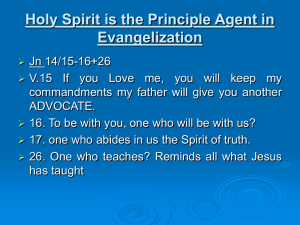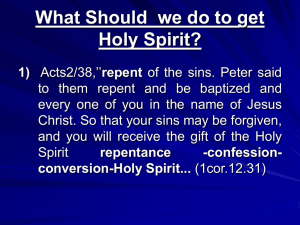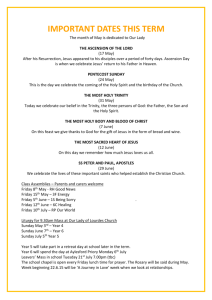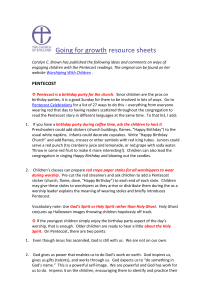It is a pleasure to be in the pulpit today
advertisement
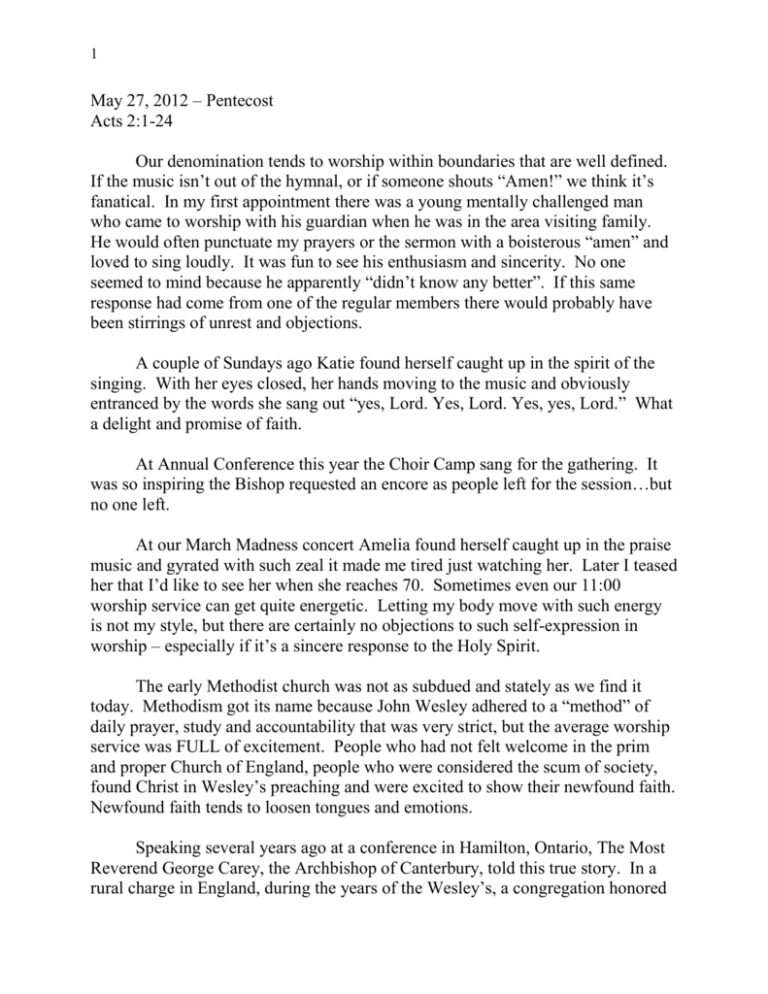
1 May 27, 2012 – Pentecost Acts 2:1-24 Our denomination tends to worship within boundaries that are well defined. If the music isn’t out of the hymnal, or if someone shouts “Amen!” we think it’s fanatical. In my first appointment there was a young mentally challenged man who came to worship with his guardian when he was in the area visiting family. He would often punctuate my prayers or the sermon with a boisterous “amen” and loved to sing loudly. It was fun to see his enthusiasm and sincerity. No one seemed to mind because he apparently “didn’t know any better”. If this same response had come from one of the regular members there would probably have been stirrings of unrest and objections. A couple of Sundays ago Katie found herself caught up in the spirit of the singing. With her eyes closed, her hands moving to the music and obviously entranced by the words she sang out “yes, Lord. Yes, Lord. Yes, yes, Lord.” What a delight and promise of faith. At Annual Conference this year the Choir Camp sang for the gathering. It was so inspiring the Bishop requested an encore as people left for the session…but no one left. At our March Madness concert Amelia found herself caught up in the praise music and gyrated with such zeal it made me tired just watching her. Later I teased her that I’d like to see her when she reaches 70. Sometimes even our 11:00 worship service can get quite energetic. Letting my body move with such energy is not my style, but there are certainly no objections to such self-expression in worship – especially if it’s a sincere response to the Holy Spirit. The early Methodist church was not as subdued and stately as we find it today. Methodism got its name because John Wesley adhered to a “method” of daily prayer, study and accountability that was very strict, but the average worship service was FULL of excitement. People who had not felt welcome in the prim and proper Church of England, people who were considered the scum of society, found Christ in Wesley’s preaching and were excited to show their newfound faith. Newfound faith tends to loosen tongues and emotions. Speaking several years ago at a conference in Hamilton, Ontario, The Most Reverend George Carey, the Archbishop of Canterbury, told this true story. In a rural charge in England, during the years of the Wesley’s, a congregation honored 2 the Priest of their congregation with a plaque. It seems that this priest managed to keep the congregation free from the influence of the Methodists during the period Methodism began to spread. To honor his ability to walk the straight and narrow during this period of emotional excess, the congregation chose suitable words. The plaque said: “To” and named the Priest, “who served in this congregation for 40 years, without a trace of enthusiasm.” We often hear of wild goings-on in places where the Holy Spirit is said to be “at work”. Laughter, rolling in the aisles, shouts of Amen that stands for “Yes, Jesus, so be it – make it so!” testify to a power we aren’t too willing to let loose these days. In congregations where the buildings and the furniture both speak of fortress-like permanence, we are resolutely uncomfortable with the clapping of hands, shouts of amen, or any movement that might possibly suggest disturbing our pew neighbor. In Acts 2:13 the disciples are accused of having too much wine. Peter stands up in their defense: “Fellow Jews and all of you who live in Jerusalem, let me explain this to you; listen carefully to what I say. These men are not drunk, as you suppose. It’s only nine in the morning! No, this is what the prophet Joel spoke. ‘In the last days, God says, I will pour out my Spirit on all people…and they will prophesy…and everyone who calls on the name of the Lord will be saved.’” The disciples are not intoxicated with wine, but with the Holy Spirit! Today is Pentecost. We often refer to it as the birth-day of the church. Christ’s power comes upon the people and they are filled with power, joy and excitement. The most excitement we usually get out of Pentecost is to adorn the sanctuary with red paraments, tongues of fire, and the pastor’s stole is red. In Ephesians, where Paul prohibits intoxication, the analogy between alcoholic influence and the influence of the Spirit is repeated. “Do not get drunk with wine, for that is debauchery; but be filled with the Spirit.” Could it be that the rather dull, tame quality of much of our religious lives indicates that we have not allowed the Spirit of God to fill us? Could it be that in our keeping God/Spirit under control, absurd as that sounds, we have missed the best of everything? In Numbers 11:17, the Spirit is “put on them”, or on those who will help Moses with his assigned task of freeing the people of Egypt. In Judges 3:10 “the Spirit of the Lord came upon (Othniel)” so that he could lead the people back to God. In Judges 6:34 the Spirit came upon Gideon so that he could win in battle against the Medianites. The Spirit came upon Samson when attacked by a lion in 3 Judges 14:6. The Spirit of God came upon Saul as he is chosen king in I Samuel 10:10. That first Pentecost must have been a chaotic experience. The eleven original disciples, the newly elected disciple Matthias, and probably a few of the women followers of Jesus, were all gathered together in one place. It wasn’t too difficult to gather the followers of Jesus together in one place at that point. They all knew the whole story. They probably talked together of what to do next. The last few weeks had been a roller coaster time of grief and joy, disbelief and amazement, moments of clarity and hours of confusion. So here they were gathered in one place, taking the comfort in the familiarity of each other’s company and waiting to see what God was going to do next. But what God did next disrupted their comfort and their familiarity. What God did next rattled the walls of the room they were sitting in. What God did next must even have rattled their senses! The whole room was filled with the sound of rushing wind. And out of the wind came fire – not a raging, all-consuming fire, but divided tongues of fire which came to rest on each person in the room. And each one was shocked at what came out of their mouths. There must have been utter chaos. Reading about Pentecost some 20 centuries later, we usually think of it as a wonderful, exciting, exhilarating experience. Maybe it was. But it also must have been terrifying. Look, after all, at what they faced. The same forces that had callously, carelessly, crucified Jesus were still in power. The disciples had spent seven weeks in fear, isolating themselves behind locked doors. And suddenly, something, an irresistible force – the best they could describe it as a mighty wind, as tongues of flame – was driving them outside. The Holy Spirit was driving them outside, not to skulk in the shadows, but to attract attention. To draw crowds. Just like Jesus. And they all knew what had happened to him! Wouldn’t you be scared? But they didn’t have a choice. Whatever it was – that wind, those flames – it flung them right through their locked doors and into a hostile world. They couldn’t stop it. God’s Holy Spirit still has that effect. Or can it? It is scary to allow the Holy Spirit to take hold of us. People do end up saying and doing things they would otherwise not say or do when the Spirit takes hold. 4 But the end result is something bigger than anything we could have thought of on our own. We have just five more weeks together, but my time here is to prepare us all for what is yet to come. No one likes change. Sometimes change is forced upon us. God, in His wisdom, helps us grow old – if we really knew what growing old was like we’d never move out of that 20 something age bracket. Some churches have pastoral leadership that goes on for 20 plus years and others have a sudden change in just months. But each age and change should be a growth experience with a seeking of the Spirit to the “what next” that God has in store. This has been an unusual Sunday. We celebrated Pentecost, remembered our military veterans of today and yesterday, and we congratulated the Class of 2012 as they move into a new chapter in their lives. In each of these is a way to examine how God has led us through to this moment and to sincerely ask “what now God?”. This is a scary time in our lives and for our world, just like it was for birthing of the church in that room on Pentecost. What now God? Dare we allow the Holy Spirit to really take hold of us and fling us out onto the streets again? What now God?



